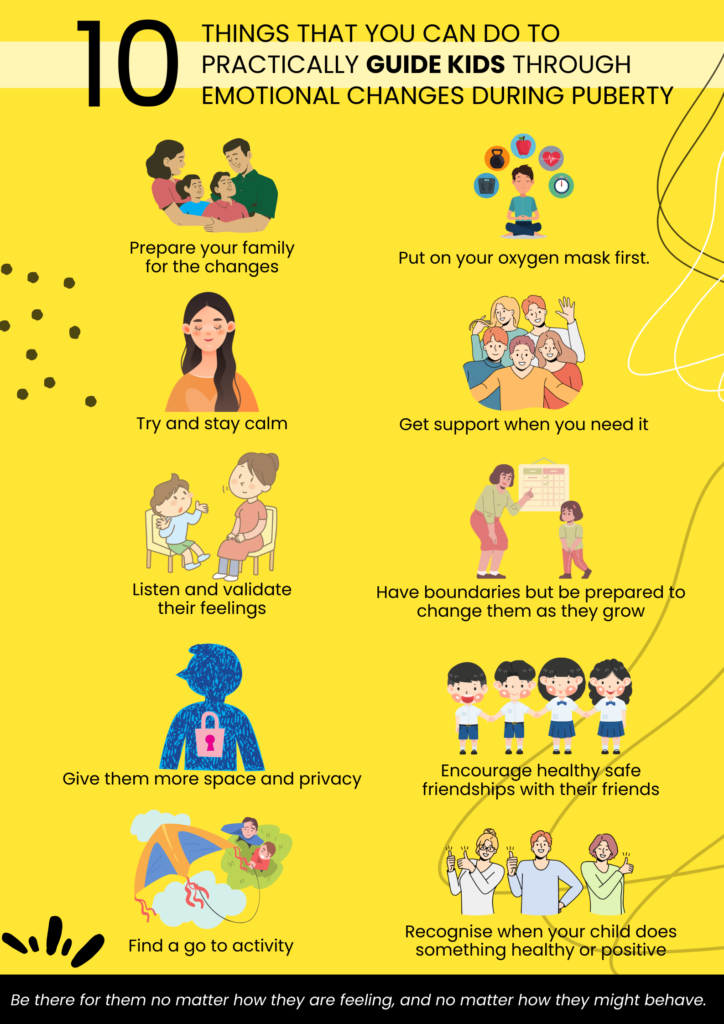Understanding the Emotional Changes during Puberty Period
Mood Swing <noun>
1. An abrupt and unaccountable change of mood (Source: Oxford Dictionary)
Have you ever heard of the saying that puberty is like an emotional rollercoaster side-to-side, fast and slow, up and down, and sometimes totally upside down? I think that that’s a great description, don’t you?
Why shouldn’t we expect our children to get moody? I would too if I had all of the hormones rushing through my body, as well as experiencing lots of physical, social, and mental changes all at the same time. What with the increasing pressure of friends, social media, school work, and our increasing societal change and anxieties that our children are experiencing.
Any wonder they encounter seesawing puberty emotional changes; mood swings-happy one second, sad the next, confused, over-sensitive, confident, self-conscious, confused, angry, emotional, feeling pressured, vulnerable, wanting more privacy, impulsive, overwhelmed, frustrated, doubting and irritable-to name a few of those rollercoaster emotions.
We expect our children to grow and change physically, socially, and mentally, so it’s actually important and normal for them to feel many, and sudden, intense emotions. It’s part of being authentically human. If we want our children to be empathetic, happy, understanding, respectful, kind, and emotionally intelligent then experiencing and understanding the emotional changes during puberty are normal.
For further reading, I recommend having a look at my blog showcasing 15 books about puberty for preteens.
As parents or caregivers, here are 10 things that you can do to practically guide kids through emotional changes during puberty:
1. Prepare your family for the changes
Be prepared that the emotional changes are a normal part of puberty and accept that your child can’t help it. Prepare them for all of the changes too, so that they know that they are normal and be ready with the tools to help them to cope.
2. Put on your oxygen mask first.
Look after yourself physically, emotionally and socially. For example get enough sleep, eat healthy, exercise and have time-out for yourself.
3. Try and stay calm
Try not to hit the roof, which is a very difficult one for me that’s for sure! Take it from me you will need unending patience! Even though you can’t make the moodiness go away, you can decide how you respond to it.
4. Get support when you need it
Getting support is often necessary for you and your child. I always say to the communities where I teach that it’s a sign of strength not weakness. Sometimes your child will not be able to, or want to talk to you either, so they will need other caring adults in their life and not just you.
5. Listen and validate their feelings
No matter whether you think that it’s an over-reaction or not, they feel it. So, encourage them not to deny their emotions.
6. Have boundaries but be prepared to change them as they grow.
As they grow and become more responsible, they still need the safety of the boundaries you set. They also need to know that you believe in them no matter what they do or how they feel.
7. Give them more space and privacy
Practise consent, for example, knocking on their bedroom door before you enter.
8. Encourage healthy safe friendships with their friends
Get to know their friends as their friends will have a huge influence on their moods.
9. Find a go to activity
Talk together about an activity that they can do when they are can do it feeling moody. For example, jumping on the trampoline, walking the dog or reading.
10. Recognise when your child does something healthy or positive
Support and praise them, for example getting enough sleep or doing a job, cooking, being kind or trying hard.
Final Words
To tell you the truth even though I knew that the emotional changes during puberty would happen to my own children, I still did not expect their mood swings and even more so I did not anticipate some of my strong reactions towards them.
It wasn’t easy but the emotional changes play a crucial role in providing our children with a sense of purpose, helping them understand their beliefs, and shaping their sense of identity. Ultimately, it comes down to your child knowing that you love them and are there for them no matter how they are feeling, and no matter how they might behave.

More resources by Amazing Me:
- Click here for my course about puberty that you can do with your child
- Click here to download my free survival guide to guide you as your child goes through puberty.
- Click here to download my free Puberty 101 guide.
- Click here to download my free “How to stay positive during puberty” cheat sheet.
- Click here to read more blogs about parenting.
- Click here for my parents and carers tips.
- Explore books about puberty and periods.







